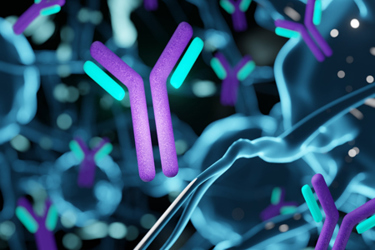Solid State Hydrogen Deuterium Exchange To Study Antibody Drug Conjugate Stability

Antibody Drug Conjugates (ADCs) have emerged as a leading option in cancer therapy due to their targeted specificity and minimal side effects and toxicity. An ADC consists of a monoclonal antibody, such as IgG, that specifically targets a tumor antigen, a stable chemical linker, and a cytotoxic drug. Given the low bioavailability and the instability of the linker connecting the antibody and the chemotherapeutic agent, these drugs are typically developed in a lyophilized form. This allows the cytotoxic agent to be delivered directly to cancer cells that express the specific antigen.
To assess the stability of lyophilized drug products, long-term stability studies are typically conducted at the intended storage temperature (usually ambient or refrigerated) over a period of at least two years. While accelerated stressed stability studies can be performed at higher temperatures, the storage temperature must not exceed the glass transition temperature (Tg) of the drug product, which can be relatively low depending on the formulation's components and excipients. Therefore, there is a pressing need for new analytical methods to predict protein stability in a shorter timeframe.
Hydrogen Deuterium Exchange (HDX) has been employed to investigate protein conformation and dynamics in solution with high resolution. In solid-state HDX (ssHDX), lyophilized solids containing a protein are exposed to D2O vapor at controlled temperature and relative humidity (RH). At designated intervals, samples are withdrawn, reconstituted in a quench buffer, and then analyzed similarly to solution HDX.
Typically, ssHDX can detect formulation differences within days or weeks of D2O exposure, significantly shorter than the months or years required for traditional stability studies. Notably, HDX, in conjunction with mass spectrometry (HDX-MS), has been used to characterize lyophilized proteins, monoclonal antibodies, and solution ADCs; however, its potential to predict the stability of lyophilized ADCs has not been previously explored.
In collaboration with Professor Elizabeth Topp’s research group at Purdue University, the Research and Development scientists at Simtra BioPharma Solutions investigated the use of solid-state HDX-MS as a tool for predicting the stability of a proprietary IgG-based ADC.
Get unlimited access to:
Enter your credentials below to log in. Not yet a member of Outsourced Pharma? Subscribe today.
